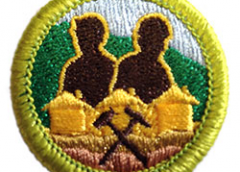By Christopher Hopkins
In February 2014, the Boy Scouts of America (BSA) along with the Society for Mining, Metallurgy and Exploration (SME) created a new merit badge, “Mining in Society,” which studies the history of mining, the purpose of the materials, reclamation and careers. There are numerous tasks that are required to earn the merit badge but there are specifically three that aggregates facilities can assist with.
The advantages are many. These boys, who will range in ages from 11 to 18, will be accompanied by parents whom you will also be able to educate about your product and industry. There will also be an adult troop leader, typically a very well respected member of the community. Some of these leaders have been involved for years and have an extensive support network in town.
In order to accomplish your part of the merit badge requirements, you would have the troop, (eight to 15 boys) visit and tour your quarry operation, followed by an hour or two of classroom experience. The classroom experience can be completed on-site or you can conduct the classroom portion at one of the weekly troop meetings.
Below are some of the requirements for the merit badge (copied from the Boy Scout Merit Badge Guidebook).
First
Do one of the following:
- Choose a modern mining site. Find out what is being done to help control environmental impacts. Share what you have learned about mining and sustainability.
- Explain reclamation as it is used in mining and how mine reclamation pertains to Scouting’s no-trace principles.
- Discuss with your counselor what values society has about returning the land to the benefit of wildlife and people after mining has ended. Discuss the transformation of the BSA Summit Bechtel Family National Scout Reserve from a mine site to its current role.
Second
Do one of the following:
- With your parent’s and counselor’s approval, meet with a worker in the mining industry. Discuss the work, equipment and technology used in this individual’s position, and learn about a current project. Ask to see reports, drawings and/or maps made for the project. Find out about the educational and professional requirements for this individual’s position. Ask how the individual’s mining career began. Discuss with your counselor what you have learned.
- Find out about three career opportunities in the mining industry. Pick one and find out the education, training and experience required for this profession. Discuss this with your counselor, and explain why this profession might interest you.
- With your parent’s permission and counselor’s approval, visit a career academy or community college to learn about educational and training requirements for a position in the mining industry that interests you. Find out why this position is critical to the industry.
Third
Do one of the following:
- With your parent’s permission and counselor’s approval, visit an active mine. Find out about the tasks required to explore, plan, permit, mine, and process the resource mined at that site. Take photographs if allowed, and request brochures from your visit. Share photos, brochures and what you have learned with your counselor.
- With your parent’s permission and counselor’s approval, visit a mining equipment manufacturer or supplier. Discuss the types of equipment produced or supplied there, and in what part of the mining process this equipment is used. Take photographs if allowed, and request brochures from your visit. Share photos, brochures and what you have learned with your counselor.
- Discuss with your counselor two methods used to reduce rock in size, one of which uses a chemical process to extract a mineral. Explain the difference between smelting and refining.
- Learn about the history of a local mine, including what is or was mined there, how the deposit was found, the mining techniques and processes used, and how the mined resource is or was used. Find out from a historian, community leader or business person how mining has affected your community. Note any social, cultural, or economic consequences of mining in your area. Share what you have learned with your counselor.
Local Affiliates
There are numerous troops within the immediate area of many plants. You can partner up with a local BSA district.
This is an outreach program that will cost very little and will promote much goodwill in the community. It could be an integral part of ongoing community outreach programs for your facility.
Christopher Hopkins is with River Landing Solutions LLC, a political consulting firm, www.riverlandingsolutions.com, 615-224-3595, [email protected].

